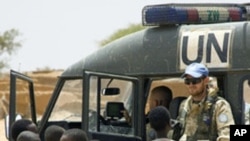The government of Chad has told the United Nations that it would like to see peacekeepers leave the country in the next few months. The U.N. says the mission is vital to protecting civilians and aid convoys that are assisting about a half million people who have been affected by conflicts in Darfur and Chad. The two sides are still trying to reach a compromise.
The U.N. mission known by its French acronym, MINURCAT, has a military and civilian presence in Chad and the Central African Republic. It is intended to create a secure environment for the 500,000 Sudanese and Central African refugees and displaced Chadians to begin returning home. In addition to protecting civilians, the 2,800 blue helmets [peacekeepers] also protect and escort aid convoys.
Chad's U.N. Ambassador Ahmad Allam-mi told reporters Wednesday that his country would like the peacekeepers to drawdown or leave completely, but that N'Djamena would be willing to keep on about a thousand international and local civilian staff.
"We want the civilian component to remain, but were told they are a package. The military and civilian component go together. And that's what we're discussing currently, to find out if there is an interim solution," he said.
Allam-mi said improved relations with neighboring Sudan and a strengthened national police force that has an improved capacity to protect vulnerable civilians are two of the reasons why Chad says it does not need MINURCAT any longer.
MINURCAT took over from a European Union force last March. It is authorized to have 5,500 police and troops, but is currently at only about 70 percent of its mandated strength.
The U.N. Security Council met behind closed doors to discuss the mission's future. A diplomat close to the talks said that although the Chadian ambassador indicated publicly that his country is flexible and open to negotiations on the mission's future, privately the government has given the United Nations only two options.
The first would be to withdraw the peacekeepers by May 21 of this year and the civilian part of the mission at a later date. The second option would be a full, immediate withdrawal of the entire mission by July.
The United Nations has said it would like the mission to remain.
"We have already hear the views of the [Security] Council, they are very much interested in maintaining MINURCAT on the spot," said U.N. Peacekeeping Chief Alain Le Roy. "That is also the view of the secretariat. But of course, we have to take into account the views of the authorities of Chad, as the host country."
As for Chad's suggestion that it keep only the civilian component which mentors the police force and performs institution building work, Le Roy said that is not an option. "No, it is known that this is not an option because we cannot keep the civilians without the military to protect them. That is not an option," he said.
He said he hoped negotiations could continue.
U.N. Humanitarian Chief John Holmes said withdrawing MINURCAT too soon could have serious humanitarian consequences. "We want MINURCAT to stay, and we want them to stay with their full complement. Because we think they are very important for the safety and security of the people in the camps, the civilians in general, and for the humanitarian operation. So we are very concerned by the prospect of withdrawal," he said.
Officials say that very clear benchmarks must be met before MINURCAT should drawdown or leave. They include the return of significant numbers of refugees and internally displaced persons to their homes, demilitarization of their camps, and adequate ability of the local authorities to protect them.
Chad Wants UN to Withdraw Mission










